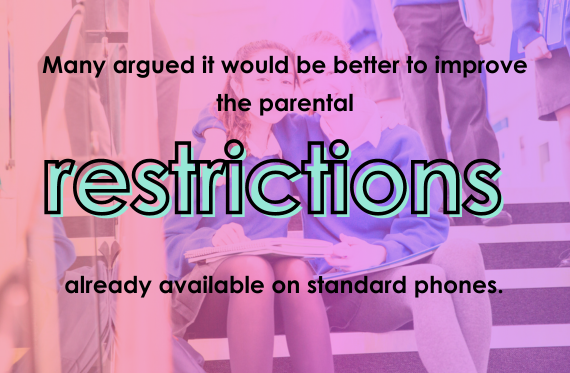5-11 votes
11-16+ votes
Total votes
For this VoteTopic, voters explored the possibility of specially-designed phones for teenagers to help improve their online safety. Throughout the wide-ranging conversations about this topic, the insights of children & young people have been largely unrepresented. That’s why this week, we are keen to hear their thoughts and opinions on smartphone usage and what the digital landscape might look like for them in the future.
16+ & College voters were asked: “Is it a good idea to have an under-16s phone?”, while Secondary voters explored: ”Would you feel safer with an under-16s phone?”, Primary 7-11 voters discussed: “Would you prefer to use an under-16s phone?” and Primary 5-7 voters considered: “Do you have too much screen time?”
57,263 young people in the UK have taken part in this vote.

"I'd prefer an under-16s phone as it could help stop cyber-bullying for children of all ages."

"There are already restrictions, why not just make those better? Will it restrict contact with my friends? That could make me feel lonelier."

"No, because young people can access smartphones and the internet either way. Also, phones provide a good sense of security and can contact parents when needed. If the phone is safe then there's no reason why they shouldn't have one [...]"
Thank you to The Molly Rose Foundation , Parent Kind and Parent Shield for responding to young people's voices on this VoteTopic!
Here's what they had to say:
"While the notion of introducing under 16s' phones for safety purposes may initially sound appealing, it's crucial to acknowledge the existing solutions that provide safety without the associated drawbacks. Specialised phones often come with high upfront costs or lengthy contracts and can carry substantial insurance costs, which could pose challenges for families. However, all modern smartphones already include parental controls, enabling parents to regulate their child's access to applications and filter inappropriate websites. Additionally, there are SIM-based solutions available that further enhance these controls and facilitate remote monitoring and automatic safeguarding alerts to parents.
Given that most children's first phones are typically hand-me-downs from their parents, the concept of under 16s' phones may seem reassuring, but ultimately, existing options offer more practical, flexible and cost-effective means of safeguarding children."


